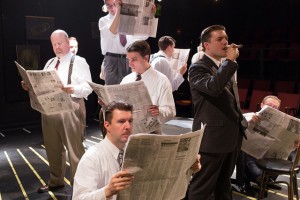An Epic Battle Between Boy Genius and Big Money, But It’s Not Black and White
“The Farnsworth Invention.” Flat Earth Theatre, Arsenal Center for the Arts, Watertown, through June 27. 617-923-0100. Remaining performances sold out.
In the 2007 Off-Broadway play “The Farnsworth Invention,” playwright Aaron Sorkin (television’s “The West Wing” and “The Newsroom”) has David Sarnoff – the eventual head of RCA (launched in 1926) and NBC (its president in 1930) – speaking metaphorically of burning down master inventor Philo Farnsworth’s television pioneering house so that he would not burn down Sarnoff ’s. Did ingenious businessman Sarnoff “steal” the official creation of television from science wonder Farnsworth as this fascinating drama sometimes suggests?
Accuracy aside, Flat Earth Theatre – continuing its “Progress and Peril Series” – turns the rivalry between Sarnoff and Farnsworth into a thrilling and very compelling cautionary tale about the potential manipulation of science and knowledge.
“The Farnsworth Invention” does give substantial time to both communications explorers’ lives – with each serving as a narrator for information about the other. Sarnoff’s backstory speaks of selling Yiddish newspapers in New York and losing his job at American Marconi when the company refused to let him take off a holiday.Farnsworth is described as “a nifty 14-year-old from Rigby, Idaho” who quickly bypasses basic high school science with a massive report that demonstrates his boy genius status. It also makes a connection between lines in farm furrows and the development of picture transmission (credit designer Rebecca Lehrhoff for having such parallel lines stretch across her spare but science and mathematics-focused set as an ongoing motif).
Despite differing backgrounds and expertise, Sorkin insightfully notes, Sarnoff and Farnsworth share a tenacity of spirit and a refusal to back down in the face of opposition to their theories and ideas. In a sense, a clever subtext of the play is a call for mutual respect. After all, Sarnoff democratically declares, “Radio stations should be run like public libraries.” He rightly sees the wisdom of what is known as “point to mass” communication, in which information is carried to many listeners – for example, the 1921 broadcast of the Dempsey/Carpentier boxing match, heard by 300,000 fans.
 Farnsworth, for his part, seems to respect Russian engineer Vladimir Zworikyn, whose 1923 “Television Systems” patent and later light storage ideas become a major source of contention in his rivalry with Sarnoff. An imagined meeting between Sarnoff and Farnsworth actually includes an invitation from the former to the latter to work at RCA and expresses the former’s intention of being a “worthy custodian” for the latter’s “extraordinary” invention. Sorkin also provides some recognition for Farnsworth’s efforts with fusion.
Farnsworth, for his part, seems to respect Russian engineer Vladimir Zworikyn, whose 1923 “Television Systems” patent and later light storage ideas become a major source of contention in his rivalry with Sarnoff. An imagined meeting between Sarnoff and Farnsworth actually includes an invitation from the former to the latter to work at RCA and expresses the former’s intention of being a “worthy custodian” for the latter’s “extraordinary” invention. Sorkin also provides some recognition for Farnsworth’s efforts with fusion.
Dramatic license and imaginative plotting aside, Sarnoff and Farnsworth both emerge as major figures here in Sorkin’s well-constructed play and the performances of the two leads under Sarah Gazdowicz’s sharp direction. Chris Larson captures Farnsworth’s likeable iconoclasm and naïveté as well as his unflagging enthusiasm for science and patent development. He also brings considerable pathos to the boy wonder’s vulnerability with alcohol and frustration trying to save his son Kenny’s life.
Michael Fisher catches Sarnoff ’s remarkable authority and feistiness as well as his vision and resourcefulness. Larson and Fisher’s imagined verbal battle is a vivid highlight. Speaking of credibility, Sarnoff warns: “You lose it and you’re in the circus.” “The Farnsworth Invention” displays welcome perspective about an under-examined rivalry. Theatergoers will see Sarnoff and Farnsworth as uncommon explorers and never as over-ambitious clowns.
– Jules Becker
An expanded version of this review can be found at the website of The Jewish Advocate.

![Chris Larson as Philo Farnsworth and Michael Fisher as David Sarnoff. [Photo/Jake Scaltreto]](https://bostontheater.files.wordpress.com/2015/06/jules-farnsworth.jpg?w=300&h=200)